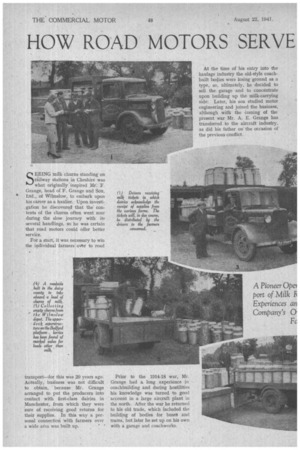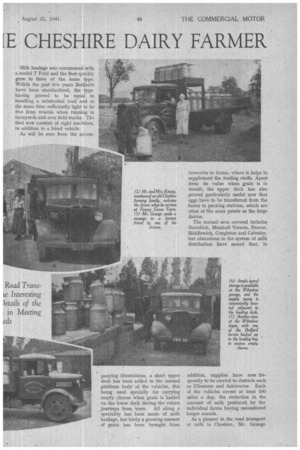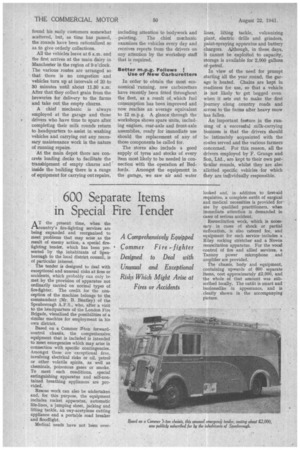HOW ROAD MOTORS SERVE [E CHESHIRE DAIRY FARMER
Page 30

Page 31

Page 32

If you've noticed an error in this article please click here to report it so we can fix it.
SLEING 'milk churns standing on railway stations in Cheshire was what originally inspired Mr: F. Grange, head of F. Grange and Son. • Ltd., of Wilmslow, to embark upon his career as a haulier. Upon investigation he discovered that the contents of the churns often went sour during the slow journey with its several handlings, so he was certain that ,road motors could offer better service.
For a start, it was necessary to win the individual farmers over to road transport—for this was 20 years ago. Actually, business was not difficult to obtain, because Mr. Grange arranged to put the producers into contact with first-class dairies in Manchester, from which they were sure of receiving good returns for their supplies. In this way a personal connection with farmers over a wide area was built up. Prior to the 1014-18 war, Mr. Grange had a long experience in coachbuilding and during hostilities his knowledge was turned to good account in a large aircraft plant in the north. After the war he returned to his old trade, which included the building of bodies for buses and trams, but later he set up on his own with a garage and coachworks. At the time of his entry into the haulage industry the old-style coachbuilt bodies were losing ground as a type, so, ultimately, he decided to sell the garage and to concentrate upon building up the milk-carrying side: Later, his son studied motor engineering and joined the business, although with the Coming of the present war Mr. A. E. Grange has transferred to the aircraft industry, as did his father on the occasion of the previous conflict. Milk haulage was commenced with a model T Ford and the fleet quickly grew to three of the same type. Within the past five years Bedfords have been standardized, the type having proved to be equal to handling a substantial load and at the same time sufficiently light to be free from trouble when running in farmyards and over field tracks, The fleet now consists of eight machines, in addition to a hired vehicle.
As will be seen from the accom
panying illustrations, a short upper deck has been added to the normal platform body of the vehicles, this being used specially for carrying empty churns when -grain is loaded on the lower deck during the return journeys from town. All along a speciality has been made of milk haulage, but lately a growing amount of grain has been brought from
breweries to farms, where it helps to supplement the feeding stuffs. Apart from its value when grain is in transit, the upper deck has also proved particularly useful now that eggs have to be transferred from the farms to packing stations, which are often at the same points as the large dairies.
The normal area covered includes NantWich, Minshull Vernon, Peover, Middlewich, Congleton and Caiveley, but alterations in the system of milk distribution have meant that, in addition, supplies have now frequently to be carried to districts such as Ellesmere and Ashbourne. Each of the vehicles covers at least 100 miles a day, the reduction in the amount of milk produced by the individual farms having necessitated longer rounds.
As a pioneer in the road transport of milk in Cheshire, Mr. Grange
found his early customers somewhat scattered, but, as time has passed, the rounds have been rationalized so as to give orderly collections.
All the vehicles leave at 6 a.m, and the first arrives at the main dairy in Manchester in the region of 9 o'clock. The various routes are .arranged so that there is no congestion and vehicles turn up at intervals of 20 to 30 minutes until about 11.30 a.m. After that they collect grain from the breweries for delivery to the farms and take out the empty churns.
A chief mechanic is always employed at the garage and those drivers who have time to spare after completing their milk rounds return to headquarters to assist in washing vehicles and carrying out any necessary maintenance work in the nature of running repairs.
At the main depot there are concrete loading decks to facilitate the transhipment of empty churns and inside the building there is a range of equipment for carrying out repairs, including attention to bodywork and painting. The chief mechanic examines the vehicles every day and receives reports from the drivers on any attention by the workshop staff that is required.
Better m.p.g. Follows Use of New Carburetters In order to obtain the most economical running, new carburetters have recently been fitted throughout the fleet, as a result of which fuel consumption has been improved and now reaches an average equivalent to 12 m.p.g. A glance through the workshops shows spare units, including engines, rear-axle and front-axle assemblies, ready for immediate use should the replacement of any of those components be called for.
The stores also include a good supply of tyres and stocks of every item most likely to be needed in connection with the operation of Bedfords. Amongst the equipment in the garage, we saw air and water
lines, lifting tackle, vulcanizing plant, electric drills and grinders, paint-spraying apparatus and battery chargers. Although, in these days, it cannot be exploited to capacity, storage is available for 2,000 gallons of petrol.
In view of the need for prompt starting all the year round, the garage is heated. Chains are kept in readiness for use, so that a vehicle is not likely to got bogged even when it sets out to make the first journey along country roads and across to the farms after heavy snow has fallen.
An important feature in the running of a successful milk-carrying business is that the drivers should be intimately acquainted with the routes served and the various farmers concerned. For this reason, all the drivers employed by F. Grange and Son, Ltd., are kept to their own particular rounds, whilst they are also allotted specific vehicles for which they are individually responsible.




























































